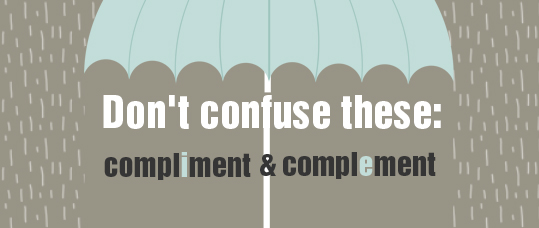Grammar Chaos: A Complimentary Lesson—Knowing Your Compliments from Your Complements
Posted on May 31, 2017
Here’s the thing with language: it could be misconstrued so easily. Use one word the wrong way, and you could potentially offend someone. Misspell something and you’ll end up meaning something else. Mistake one letter for another, and you could miss out on opportunities.
Today on Grammar Chaos, compliment versus complement. And yes, these two words are completely different. Read on to find out why.

Compliment with an “i” offers praise. Complement with an “e” means that something fits in with something else. For example, you may compliment someone’s shoes, but you probably don’t complement their shoes.
Here are some examples to help you work out the difference.
Mr. Jameson complimented Hans and Janna for their hard work on their project.
Hans and Janna complement each other well, so they were able to do a good job.
Bill’s painting received many compliments from the visitors.
They noted how well the colors complement each other.
There is a reason why these two are so closely spelled. Complement with an “e” has been used in the English language for as early as 1300. The noun comes from the Latin complementum, or “something that completes.” Compliment with an “i” wasn’t used until 300 years later. Cumplimiento, which is Spanish, somehow made its way to English. The Spanish word means “fulfillment,” which ultimately derives from—you guessed it—the Latin complementum. In English, compliment means “an expression of/to express praise,” which sort of makes sense since praise can be pretty fulfilling, right?
How about complimentary and complementary? Same thing. When something is complimentary, it’s favorable, or free, just like a complimentary hotel breakfast. When something is complementary, it completes another, just like how red and green are complementary colors.
Other than their Latin roots, another similarity between compliment and complement is that they can be used both as verbs and nouns. Pretty straightforward right? If you find yourself in a pickle and can’t seem to remember which one to use, here’s a helpful tip to remember: something that complements, completes.
Got any other grammar issues? Still confused? Shoot us a message, and we might feature your query next!
Sources:
Disclaimer: Image is not ours. Credit to the owner.
About 1-Hour Proofreading
1-Hour Proofreading is a growing start-up offering fast and efficient editing services at a reasonable price, with the assurance that the document is publication-ready the soonest you need it. Its team of highly competent professional editors is committed to helping those in need of quality editing services while facing tough deadlines.
Visit 1hourproofreading.com for more details.
Follow us:
Back to Grammary



